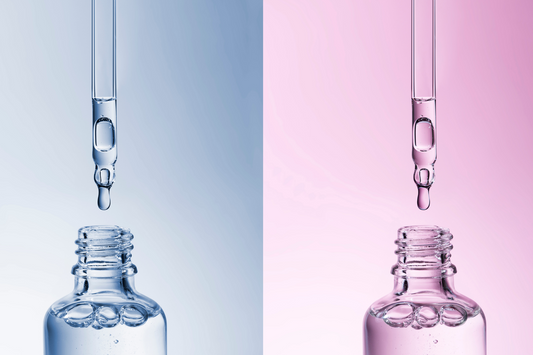Scientific solutions to common problems like hair loss are becoming more prevalent and more accessible by the day. While some of these solutions—like minoxidil, finasteride, or the off-label usage of dutasteride—represent medical options using FDA-approved pharmaceuticals, many more options for treating everyday issues like hair loss are available over-the-counter as dietary supplements or topical serums.
The importance of maintaining a balanced diet is obvious: Nutrients like vitamins and minerals, proteins, fatty acids, and other compounds represent the fuel that our body uses to grow, conduct cellular maintenance, and perform other essential functions that take place in the background on an everyday basis.
One supplement whose use has been gaining attention is Collagen, particularly marine collagen. What is marine collagen, what makes it unique, and why has it grabbed the public’s attention as a potential new avenue for addressing hair loss complications like telogen effluvium, post-partum hair loss, and androgenic alopecia? Read on to find out more!
What is collagen?
Before we dive into Marine Collagen, let's discuss collagen. Collagen is a type of protein primarily found in the connective tissues within the body as part of the tissue’s extracellular matrix. Connective tissues are made up of three key components:
- Fibers, which include the filamentous fibers of collagen and elastin.
- Ground substance, a gel-like material that includes all other components of the extracellular matrix (ECM) except for the fibrous components like collagen and elastin.
- Cells, including:
- Adipocytes, or fat cells.
- Fibroblasts, which synthesize the ECM and collagen.
- Leucocytes, or white blood cells.
- Mast cells, part of the immune system.
- Macrophages, a version of white blood cells that consume pathogens.
What is Marine Collagen? And why use it as a supplement?
The primary amino acids found in collagen—glycine, proline, and hydroxyproline (a metabolized version of proline)—can be obtained from a variety of dietary sources, rather than exclusively being found in purified collagen supplements. Sources of collagen can be broken down into three primary categories:
- Animal-based collagen, produced from the collagen-rich skin, bone, tendon, and muscle of livestock like cows and chickens.
- Vegan collagen, produced without any animal byproducts by synthesizing collagen in yeast or bacteria that have been altered to include genes for collagen production.
- Marine collagen, produced from the skin, scales, and bones of fish, sponges, and jellyfish.
Going point-by-point, we can see why marine collagen has seized commercial and mainstream attention. For starters, not all customers may able to consume animal-based collagen sourced from cows or pigs due to religious reasons. That may make a collagen supplement sourced from cow or pork immediately unappealing to a large segment of the population—not ideal when trying to market a product for mass appeal!
And though a subset of the customer base would likely prefer a vegan alternative, the yeast and bacteria required to synthesize that vegan collagen are, by definition, genetically modified organisms (GMOs) due to the fact that they contain genetic information from other unrelated organisms. Given that detail, many consumers, particularly those looking to explore dietary supplements, may find GMO-containing supplements unappealing. On top of that, factor in the cost and expertise necessary to employ the additional equipment required to grow, harvest, and maintain the cultures of yeast and bacteria, and it seems reasonable that the costs of producing vegan collagen may not align with the available market for the end product.
Marine collagen seems to represent a commercial sweet spot. It can be harvested through processing fish byproducts and scraps that would either be set aside for other purposes or go to waste, meaning that the raw materials for isolating collagen from fish can subsequently be obtained at a low cost. While some consumers may have issues with eating fish or fish byproducts, that subset of the target market for collagen supplements is likely smaller due to fewer religious or cultural restrictions on the consumption of fish compared to livestock like cows or pigs.

What happens to collagen in the body?
|
Essential |
Conditionally Essential |
Non-Essential |
|
Histidine |
Arginine |
Alanine |
|
Isoleucine |
Cysteine |
Aspartic acid |
|
Leucine |
Glutamine |
Asparagine |
|
Lysine |
Glycine |
Glutamic acid |
|
Methionine |
Proline |
Serine |
|
Phenylalanine |
Tyrosine |
Selenocysteine |
|
Threonine |
|
|
|
Tryptophan |
|
|
|
Valine |
|
|
What does it mean for an amino acid to be essential?
An amino acid is considered essential if it must be obtained from an external source as part of a typical diet. Some amino acids can be synthesized, or made, within the body using the repurposed nutritional building blocks from other compounds. For the 9 essential amino acids listed above (histidine, isoleucine, leucine, lysine, methionine, phenylalanine, threonine, tryptophan, and valine), they must be consumed.
In some cases, stress, illness, and dietary scarcity can make an amino acid conditionally essential. These amino acids (arginine, cysteine, glutamine, glycine, proline, and tyrosine) are in higher demand during those conditions.
Why is amino acid content important when it comes to understanding marine collagen supplements?
When pitched as a supplement, marine collagen is purported to have beneficial effects on human hair growth, skin elasticity, and joint health. The reasoning goes that as hair, skin, and joints contain collagen, consuming more collagen in the diet can benefit the health, growth, and maintenance of these collagen-rich cells and tissues. The exact process is a bit less straightforward, however.
To be used, collagen must first be broken down into its components
The notion that consuming collagen, including marine collagen, will have a direct impact on collagen synthesis is an oversimplification. While we can consume and digest collagen, it isn’t as through we absorb the protein itself directly and patch it into our growing skin and hair cells. As collagen-rich foods begin their journey through the digestive tract, the hydrochloric acid in our stomachs combine with the enzyme pepsin to denature the collagen proteins and break them apart into smaller protein building blocks called peptides. Peptides themselves consist of small chains of multiple amino acids, but need to be broken down even further before they can be absorbed.
The constant churning and contraction of our stomach muscles mixes and combines this peptide-rich slurry into a mixture called chyme. As the chyme enters the small intestine, additional enzymes from the pancreas—chymotrypsin and trypsin—break down these peptide chains into the amino acid building blocks that our own cells can finally make use of. Remember: The goal is to benefit the scalp and hair, and our marine collagen supplement is only part of the way there!
Once broken down, those components have to reach the collagen-synthesizing fibroblasts
Once the smaller peptides and amino acids are absorbed into the bloodstream, they’re transported to the liver, where up to 65% of the initial amino acids remain. The liver then works to regulate the level of the additional amino acids that circulate through the bloodstream and reach the other cells in the body—like the collagen-synthesizing fibroblasts we’re interested in.
Located throughout the connective tissue that permeates our bodies, fibroblasts receive the amino acid building blocks from the bloodstream and can go about repurposing them into collagen proteins. The complex process of DNA transcription and protein translation necessary to synthesize collagen requires additional vitamins and minerals, including:
- Magnesium
- Zinc
- Ferrous iron, or Fe2+, the reduced form of iron ions that are more bioavailable
- Ascorbic acid, or vitamin C
We’ve talked about it before in other pieces, but vitamin deficiencies can contribute to a variety of issues like hair loss. Here we can see another example of how nutrients like zinc and vitamin C can play a key role in the synthesis of compounds like collagen, even though they may not be part of the final product themselves.
Collagen synthesis is a complex process that requires more than just collagen supplementation
As we’ve seen above, boosting our hair health with a daily supplement like marine collagen isn’t quite as simple as it may be described by the manufacturers of dietary supplements. That isn’t to say that consuming dietary collagen is useless! In the human body, we produce 28 unique types of collagen, each with a slightly different structure and amino acid content. Each type of collagen serves a different purpose and may have different proportions of those amino acids.

If it’s all about the amino acids, why take collagen as a supplement at all?
Though research into the consumption of collagen and its direct benefits on the health of our hair and skin is limited, the key factor remains that for our bodies to synthesize collagen on their own, they require a set of ingredients in the form of amino acids alongside vitamins and minerals that facilitate the necessary synthesis reactions.
As we’ve hopefully shown above, once any protein—including collagen—enters our bodies through the gastrointestinal tract, it’s broken down into its individual building blocks, known as amino acids. It’s these amino acids our body can make use of, rather than the dietary collagen itself. When it comes to promoting hair and skin health, the important factor is having the right amount and proportion of these amino acids available in order to produce the collagen locally inside the fibroblasts in our connective tissues.
Reviewing the table of essential and non-essential amino acids, we see that the amino acids necessary to make collagen—proline and glycine—are considered to be conditionally essential. This means that our bodies can make these amino acids at sufficient levels by repurposing and modifying other amino acids, but that in periods of extreme stress or injury that would require larger amounts of collagen, like wound healing from a large burn to the skin, additional supplementation would likely be required.
Hair growth doesn’t necessarily fall into that category of an extraordinary traumatic process that would stimulate our bodies to start responding differently than usual by rushing cells and nutrients to the site of the injury. However, having a stable amount of these amino acid components on-hand within our bodies to facilitate collagen production seems like a reasonable conclusion.
Marine collagen supplements for hair growth: The verdict
When it comes to improving the health of your hair, we’ve previously discussed the role of collagen supplement here and here. While dietary collagen isn’t absorbed and put to work directly, the molecular ingredients found in dietary collagen have a similar profile to the collagen found in the human body. Having more of the required ingredients to produce collagen, including any relevant vitamins and minerals that serve as cofactors or play a key role in the formation or enzymes, means that our bodies are being given all the necessary tools.
However, as we’ve discussed above, the amino acids found in higher proportions in collagen—like glycine and proline—aren’t exclusively found in collagen: It’s possible that we can obtain those amino acids from other dietary sources, including foods we typically eat that incidentally contain collagen.
Collagen supplementation: an analogy
As a supplement, collagen contains proportions of those amino acids. Think of building proteins like collagen as similar to building a house: You can construct a new building from scratch by building the beams, walls, and support structures from the raw materials like wood and nails, but you have to make sure that you have the right amount of materials, tools, and training to get the job done.
Amino acids are our raw materials in this analogy. If you’re in the construction business already, however, it’s likely that you have the necessary expertise and are well-equipped with the plans and raw materials for the task. In our case, our body has the plans hardcoded in our genes, and a healthy, balanced diet means that we likely have all the amino acids we need at our disposal.
On the other hand, if you happen to currently live in your dream home and just want to move it to a different location, you can partially deconstruct it and reassemble it elsewhere. This guarantees that you’ll have the same layout and design because you already possess everything necessary to build the final product. Think of dietary collagen as that dream home, digesting the collagen as the process of deconstruction, and collagen synthesis in the fibroblasts as raising the same home anew in a different location.
Going this route may not be necessary even though you can be a bit more certain that you’re going to end up with what you’re looking for. If we keep using the same analogy, it’s easier and cheaper to relocate a house to the other side of town than it is to move it across the ocean to a different continent. Sometimes our goals are easier to accomplish with what we have on hand—in this case, building the house with wood and tools that are already at our destination would be akin to synthesizing collagen from dietary amino acids that we’re already obtaining from other sources like fish, chicken, egg whites, and leafy greens. Moving our particular disassembled house on a boat across the ocean—like seeking out a particular collagen supplement that will only be disassembled by the acids and enzymes of our stomach anyway—would be particularly unnecessary, wasteful, and costly without yielding any discernable improvements.
Choosing a source of collagen—like animal, vegan, or marine—would be similar to choosing a variation of some key component, like flooring or paint color. For a variety of reasons, some customers may prefer the look of oak boards, the sustainability of bamboo, or the price of vinyl or laminate, but the functional outcome—a floor to walk on—remains the same.
The takeaway on marine collagen
We’ve hopefully clarified the nuts and bolts that underlie collagen supplementation. Though the scientific research on collagen supplementation for hair growth is inconclusive, the fact remains that our bodies require the same building blocks to synthesize our own sources of collagen. We may already obtain those amino acid building blocks from other dietary sources, making supplementation with marine collagen extraneous, excessive, and economically wasteful. For some individuals, collagen supplementation may yield benefits by addressing an underlying dietary shortfall—it’s even possible that the process of maintaining a daily regimen of dietary supplements can lead to a greater awareness of your overall health, which can lead to benefits on its own.
For the above reasons, as a product, marine collagen likely isn’t superior to any other dietary sources of collagen. It represents an economic sweet spot and opportunity for manufacturers to reclaim a viable ingredient from organic materials that would otherwise go to waste, not a premium category or source of collagen itself.
Dietary supplementation with collagen, from marine sources or otherwise, remains inconclusive for hair growth. If you’re considering any dietary supplementation, consider talking with your doctor to find out what’s best for you. Because of the indirect nature of collagen digestion and synthesis, taking a marine collagen supplement could be throwing your hard-earned money down the drain.





